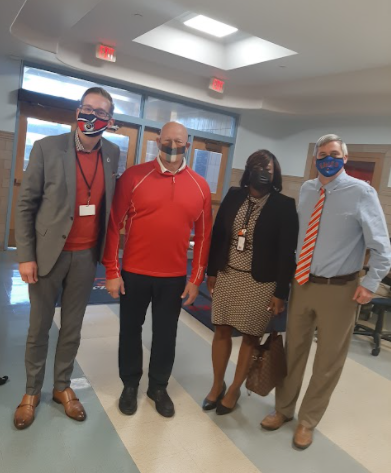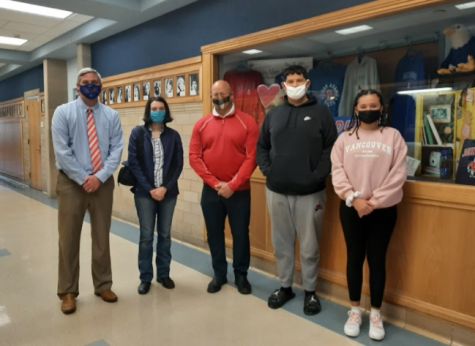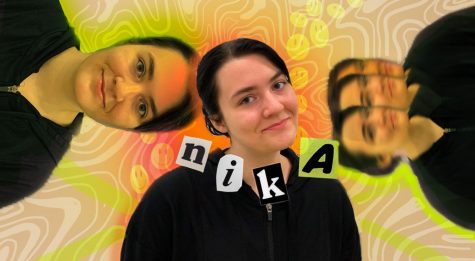Telling Our Story

Superintendent Cummings, Mr. Wieczorek, Mrs. Robinson, and Principal Seitz pose for a picture on Wednesday, Oct. 27.
November 4, 2021
These were the words that John Adams High School was waiting to hear all day from Gregg Wieczorek, president of the National Association for Secondary School Principals. His Oct. 27 visit had been an honor to our school and principal Seitz could not have been more excited. Mr. Wieczorek is experienced; he had been a principal for twenty eight years. Mr. Wieczorek’s mission as the president of NASSP entailed visiting schools in all fifty states. He collected information on what schools were doing well in and blogged that information. Mr. Wieczorek shared the blog with all of the principals in the country for them to have access to; his goal was to connect principals from all around the country and improve their schools. He was based in Milwaukee, Wisconsin where he managed Arrowhead Union High School in Hartland.
When Mr. Wieczorek entered the school that afternoon, he was welcomed by Superintendent Todd Cummings among other South Bend Community School Corporation officials. The entourage of Mr. Wieczorek, Mr. Seitz, Mrs. Robinson, and Mr. Jones looked around hopefully as they became oriented in our establishment. After a brief introduction in the main office, they embarked on a tour around our school. They were going to visit a few classes that represented JAHS very well. The assembly marched past the horseshoe stairwells as Mr. Seitz filled in Mr. Wieczorek on our school’s architectural history. Our guest had been searching for innovative ideas within the programs and classes that he would enter.
The visitor and his assembly’s first stop had been a bilingual government class for English language learners. The international students were learning about US citizenship, which is vital for many living in America. This was an example of the programs that our school provided to foreign students, and Mr. Seitz talked about the kids from abroad. The next stop was a pre-international baccalaureate class led by Mr. Cline. He was preparing his social sciences students for a more advanced curriculum. Mr. Seitz explained how some classes in JAHS receive college credits, which gladdened Mr. Wieczorek. They were met by a room strewn with newspapers and industrious kids searching for hidden agendas and issues Mr. Cline wanted them to find in the texts. Mrs. Elliott’s regular tenth grade English class was next on the list. The kids were watching a video related to Harper Lee’s To Kill a Mockingbird. This book offers an excellent example for kids to learn about judgement and Mrs. Elliot was bettering society by morally educating these students.
The highlight of that Wednesday was getting to meet student representatives for groups that were focused on issues in our community. The B.R.O.T.H.E.R.S. and L.O.V.E. groups are African-American based clubs that Mr. Wieczorek got to hear from. Some of their focuses are to combat high expulsion and suspension rates, low graduation rates, violence, or drug usage among students of color in JAHS. These programs have brought many kids together in order to help the community and function as support groups. The activities that these groups carry out range from cleaning up trash from the western side of town, hosting pep rallies, listening to guest speakers, raising money for beneficial causes, to enjoying the social experience that these groups offer.
“It helped make me feel more open and helped me be able to talk to other people about different racial issues,” said Lexi Lipsey, a representative for L.O.V.E.
Chris Buck, another senior who showcased B.R.O.T.H.E.R.S., had emphasized how involvement in these programs connected kids to the school more. B.R.O.T.H.E.R.S. and L.O.V.E. are described as diverse, inclusive groups that promote unity within the school. Buck often referenced the good resources that this group presents for people in need of them. This meeting was an opportunity for Wieczorek to interpret how our school was managing the ineludible problems that arise in many communities. From all of the problems these groups seek to resolve, they also reach out to kids affected by gun violence.
“Bullets don’t have names,” remarked Tim Davis, a senior representative for B.R.O.T.H.E.R.S. as he was describing how that unfortunate aspect interferes with students’ lives.
Their tones got serious as they discussed this topic; Mr. Geissler, a social worker, joined in the conversation. Geissler is devoted to improving the wellbeing of our students and has gone to great lengths to do so. It was mentioned that our school had been using their referendum money to afford more social workers. This shows that JAHS has put forth its effort into making the world a safer place and created brilliant circumstances for students to interact with each other. Mr. Wieczorek was enthralled with our graduation coaches and other means of helping adolescents reach success. Buck, Lipsey, and Davis have all mentioned how their groups have been evolving, regardless of COVID-19 related setbacks.
“For me, It does not matter how good you think your programs are and how effective they are. The way that they become effective is because of the people that you have,” said Mr. Seitz.
The retinue made their way up to the second floor for more visits, as Mr. Seitz proudly pointed out his favorite spots in JAHS. There was a festive air to Mrs. Stanton-Verduzco’s IB Spanish HL course when they visited; her students were constructing altars for Day of the Dead. Mr. Wieczorek gladly inspected the advanced, entirely Spanish class. Their assignment was to make an ofrenda for a historical hispanic figure; senior Connor McKenna had presented his poster of Evita Peron before Mr. Wieczorek. Mrs. Stanton-Verduzco proudly sponsors National Honor Society, Quizbowl, and Spanish Club, which compose a fair portion of the extracurricular activities our school has to offer. The next stop was across the foreign language hallway, near the gym. As the team walked into Mr. Melander’s architecture and design class, they were greeted by students presenting their Sketchup 3D Modeling house designs to others. These career and technical education students are planning to present their styles to the chamber of commerce. Mr. Wieczorek looked around in approval as the young adults were busying themselves with real life applications.

The excursion around the school brought them back to the starting point at the main entrance, where they walked back into Mr. Seitz’s office. Along the way, Mr. Wieczorek marvelled at the totemic sequence of portraits of our valedictorians dating back to the school’s earliest years. As they sat down around a conference table again, Mr. Wieczorek was more than happy to discuss his findings and give a more extensive understanding of NASSP and its goals to JAHS administrators. When asked about the problems that Mr. Wieczorek and NASSP sought to resolve, he offered to talk about the unfilled teaching positions.
“We are heading towards a serious problem in our country with our teacher shortage…we are putting people in those positions who have a background of the area but do not have any pedagogical knowledge nor understanding of the curriculum,” Mr. Wieczorek explained.
He elaborated on this topic, mentioning how the role of an educator was not as prestigious as it had been in the past. Mr. Seitz highlighted how negative media attention also tarnished the reputation of schools since news coverage found adverse developments more appealing to their audience rather than the achievements. The principal regretted how there could be dozens of great things in a school, but the press would rather cover a fight, stabbing, or shooting and dwell on it. Mr. Wieczorek made it clear that the shortage is not exclusive to any region in America, and that he could feel its effects in Wisconsin.
“Hardly anybody puts education as their major…there are two reasons: too much work and lack of respect for educators,” lamented Mr. Wieczorek.
He went on to explain the potential effects of a teacher shortage in the country. Mr. Wieczorek likened school to an iceberg, saying that what most people see is just the tip, sitting out of the water with the rest underneath. Everybody is doing all of this work beneath the surface and most do not know what is happening and do not ask for educators’ opinions. Politicians do not have the experience of being in a school and certainly not as an administrator or teacher. In regards to lawmakers, Mr. Wieczorek pointed out the need for people like Mr. Seitz informing legislators and policy makers on what really happens inside of a school so they can make decisions that would impact people every day.
“The only thing that separates us from third world countries is that we have a formalized education system that allows young people to go out and do their jobs. Education is the foundation of our society. If you remove it, we will become a third world country. That is where we are heading if we cannot put quality people into classrooms,” Wieczorek pointed out.
Wieczorek had been concerned about lesser professionalism in classrooms. With the advent of technology, more students are learning from screens and Wieczorek mentioned if this continues, there is significant evidence that this module of learning would be detrimental to student performance. He said that average students would suffer from this precedent. He stated that it will have a huge impact on our society and will manifest itself in nearly fifteen years. COVID-19 has also catalyzed online learning and this year, there have been nearly 50-100 of high schoolers in South Bend virtual school.
In regards to addressing teacher shortages, Mr. Wieczorek said that he would try starting this systematic approach which his successors could follow. In other words, he wants decent teachers to observe great ones; sharing stories of success nationwide is his approach. This concern for public education served as the main reason as to why Mr. Wieczorek ran for president of NASSP and hopefully, his solution will work. His travels across America will provide him with many examples of how different schools comprehensively take on unique sets of problems. When asked about his adventure in JAHS, Mr. Wieczorek echoed to stay connected and to tell our stories. Our principal celebrated the discussion and noted that he received valuable knowledge from it.
“It’s fantastic! I have picked up three or four things from our conversation that other schools were doing and think we could implement into our own school,” Mr. Seitz said; his excitement showed when he spoke about JAHS.
Towards the end of the meeting, Mr. Wieczorek lauded our school and wished us well in his closing remarks.
“You’re lucky to have a really great school and a great principal…the students, the parents, and the community should be really proud of this school because it is very special,” Wieczorek praised.


